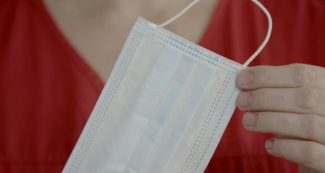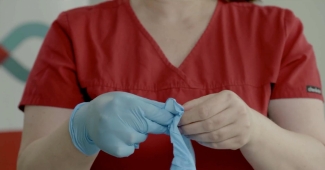Masks will be available
- We will continue to offer surgical, N95 and cloth masks to anyone who would like to wear a mask.
Eye Protection
- Eye protection for employees, volunteers and contractors is available.
Jump to
Questions and answers
Why are we removing these measures now?
The organization’s journey since the beginning of this pandemic has been cautious and measured. All decisions have been made in consultation with our medical and epidemiology experts and at minimum, meeting applicable public health requirements.
In recent months, we have seen restrictions being eased in many community venues and workplaces across the country. Similarly, over the last few months Canadian Blood Services has rolled back some of our own COVID-19 measures. Wellness checks at our entrances have evolved, in-person recruitment has resumed, media has been allowed back into collection events, we’ve brought snacks and hydration back inside our sites, we’ve determined pandemic leaves are no longer required and we have also reduced our enhanced cleaning measures.
We’ve determined it’s the right time for additional adjustments to some of the remaining COVID-19 protocols. Our suspension of these measures aligns with epidemiological advice: that we are at a stage in this pandemic where we can shift from mandatory to optional measures. This can happen because the majority of Canadians are fully vaccinated, and illness now caused by COVID-19 is far less severe in most cases.
We have been committed to monitoring and assessing our COVID-19 measures and we have been responsive to changing scientific knowledge and epidemiological conditions. We will continue to closely monitor the epidemiology and scientific knowledge so that we remain agile to reintroduce mandatory masks and physical distancing if necessary.
Will we still make masks available to employees, donors, volunteers and visitors?
Yes. Masks, including N95s, will still be available to staff, volunteers, visitors and donors.
What if we experience another wave in the pandemic?
We have been committed to monitoring and assessing our COVID-19 measures and we have been responsive to changing epidemiological conditions and scientific knowledge. We will continue to closely monitor the epidemiology and scientific knowledge so that we remain agile to reintroduce mandatory masks and physical distancing if necessary.
I have a health condition and will need to continue wearing a mask to protect myself. I would feel safer if everyone else around me would to.
Employees who have concerns related to workplace safety matters should discuss them with their supervisors or PCP business partner. The OHS & EHS teams (ask.ohs@blood.ca) are available to respond to any safety concerns. Any concerns related to accommodation needs related to medical considerations can be discussed with EHS Coordinators. Your well-being is a priority, and we are here to support you through this transition. Everyone is welcome to and encouraged to continue wearing a mask and to physically distance where feasible in our sites.
I don’t feel comfortable working so close to donors who choose not to wear a mask.
We understand that after two years of mask-wearing, you may feel uneasy being around others who are not wearing masks. Employees are encouraged to wear masks when they are close to other people. Being a fully vaccinated workplace and knowing that the majority of donors are also vaccinated supports epidemiological advice that we are at a stage in this pandemic where we can pull back on these requirements.
Employees who have concerns related to workplace safety matters should discuss them with their supervisors or PCP business partner. The OHS & EHS teams (ask.ohs@blood.ca) are available to respond to any safety concerns. Your well-being is a priority, and we are here to support you through this transition. Canadian Blood Service has a number of programs available to help employees, including free access to licensed mental health professionals, mindfulness tools and monthly wellness workshops.
For more information on these programs and how we are supporting employee wellbeing, visit https://connect.blood.ca/about-you/your-well-being
I’m not required to wear a mask to do my job, but my role takes me into other external sites.
If your work takes you into a setting that requires masking (for example, a hospital) we ask that you respectfully comply with that site’s requirements.
If employees, volunteers, contractors and donors decide they want to wear a mask, do they still have to wear one of ours?
No, if anyone chooses to wear a mask, they are free to wear their own. However, we will have surgical masks available and would encourage people to take ours if they’d like.
Will the wellness poster checkpoint and handing out of the masks be self-serve since they are optional?
There are a number of details, including these, that we are still working through. A change such as this requires a lot of work behind the scenes. Although you may see an immediate change to some things as of July 25, it will take time for the organization to adjust other aspects of our operations. We appreciate your patience as we make these adjustments to implement this change. We will continue to provide updates as they become available.
Does this mean we are going back to normal, and our sites will operate like it did before the pandemic?
Although we are scaling back on some of our COVID-19 preventative measures, our sites will continue to transition to full occupancy in a managed way. We are committed to both safety and agility for this transition. Masks and physical distancing are still encouraged and welcome. Routine cleaning will continue on surfaces that come in contact with donors. We ask employees to make sensible choices when booking gatherings and meetings. Although physical distancing requirements are being removed, we will assess the steps to open up all spaces up to 100% capacity. A change such as this requires a lot of work behind the scenes. We appreciate your patience as we make these adjustments.
I thought we considered ourselves a healthcare setting?
Canadian Blood Services is a unique organization. Although we provide life-saving products to patients, we are not a hospital or healthcare setting. We consider ourselves a community setting and determined we are at a stage in this pandemic where we can shift from mandatory to optional measures.
What if a donor asks me to wear a mask?
It is entirely up to each individual employee to decide if they want to wear a mask when interacting with a donor. If you decide to not wear a mask, explain that wearing a mask is a personal choice in our site at this time. The donor is welcome to wear a mask and we can also provide them with an N95 if they prefer. You may let them know that Canadian Blood Services is a fully vaccinated workplace. Evidence shows that transmission likely occurs with prolonged exposure (at least 15 minutes) and that our staff are rarely in close proximity to donors for that amount of time.
Questions and answers
Can I reuse a surgical mask?
A surgical mask must be changed at any point if the employee feels they have become contaminated, soiled or damaged. Please refer to the masking guide available through your supervisor for further instructions.
Why aren’t we fit testing the N95 masks?
Employees are welcome to wear an N95 masks while working. Fit testing is not available at this time. Employees can feel assured that although their N95 is not fit-tested, they are still generally more effective than surgical masks. We have also provided comprehensive guidance on how to use them properly on our PPE page.
Can I reuse a N95 mask?
N95 masks are designed to be single-use PPE. Although there is ongoing research about the extent to which N95 mask may be re-used, Canadian Blood Services does not recommend re-use of N95 masks.
Are N95 masks recyclable?
Yes. Look for recycling receptacles in your workplace.
What are we doing to mitigate the environmental impact of mandatory surgical masks?
To minimize the impact of disposable masks, we have rolled out a surgical mask recycling program at all Canadian Blood Services sites. Terracycle Zero Waste Boxes are in our facilities across the country. Employees are encouraged to place their used surgical masks in the boxes for recycling. How is this helping exactly? Terracycle will take the used masks from over 50 locations and make them into new products like shipping pallets or plastic lumber. Employees are reminded to detach the straps from their surgical masks to reduce the impact of wildlife entrapment. If you have questions about the new recycling program contact carlene.vanderheiden@blood.ca.
Does Canadian Blood Services use surgical masks containing graphene or biomass graphene?
Canadian Blood Services’ surgical masks do not contain graphene or biomass graphene.
Our vendors are licensed by Health Canada and have confirmed with us that they do not use graphene or biomass graphene in their manufacturing process.
Tracking our PPE inventory
To help you understand how our supply levels are doing, we have created a PPE inventory tracker.
What’s new this week
We are monitoring the use of our PPE inventory update the tracker with the latest usage and supply levels seen week-to-week.
Our PPE continue to sit at very healthy inventory levels. All items are sitting at or above target inventory levels based on criticality.
If you have been approached or are aware of new sources of supply, or have questions about our PPE and safety products, please forward them to our procurement team.
Types of masks used at Canadian Blood Services
Before providing masks to our teams, our vendors must demonstrate their supply of masks are acceptable by Health Canada.
We have sourced inventory of masks from a number of different suppliers. Click below to see the different brands of masks available to frontline employees, what the packaging looks like and how the masks look when worn. If you have questions or concerns please reach out to the procurement team for further guidance.
Oliberte Level 1 – 50 Pack

- Surgical masks are most effective when dry. If your surgical mask becomes wet from perspiration or otherwise, it should be removed immediately. Canadian Blood Services supply of Canadian Oliberte Masks are certified to ASTM-1. Meaning they meet a certain level of breathability and filtration efficacy.
- There are circumstances where the mask could become wet within an hour of wearing it, such as excessive sweating. For this reason, Oliberte has recommended that their masks be exchanged after one hour, as they cannot regulate that the user will know to change their mask should it be become wet.
- ASTM-1 certified masks, such as the Oliberte supply, should be changed once every eight hours unless the mask has become wet. Should the mask become wet from sweating or otherwise, it should be changed immediately.
- To limit the spread of COVID-19, surgical masks should not be reused
Ensy (ProMed) Level 3 – 50 Pack (hypoallergenic)

- Surgical masks are most effective when dry. If your surgical mask becomes wet from perspiration or otherwise, it should be removed immediately.
- Our supply of hypoallergenic masks are limited. We encourage employees to only use these masks if needed.
- To limit the spread of COVID-19, surgical masks should not be reused
3M™ N95 8210 Mask
N95s are disposable masks that filter 95% of particulates and aerosols as small as 0.3 microns from the air. They should be worn as directed by the manufacturer, and removed like this. N95s are designed to be single-use, and should be discarded after they are worn. N95s should also be disposed of if they become damaged or wet.


